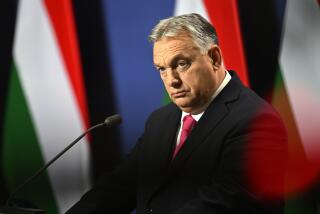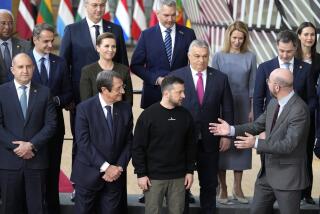EUROPE : EU Has Change of Heart Toward Nations to East
- Share via
BRUSSELS — During the massive street protests that accompanied Eastern Europe’s anti-Communist revolutions during the fall of 1989, demonstrators frequently carried with them a blue flag bearing a circle of 12 gold stars.
The flag--that of the 12-nation European Union, formerly the European Community--symbolized the aspirations of those from the long-oppressed East, not just to partake of the affluence that has come to characterize the social democracies of Western Europe but also to embrace the values of a union built on free-market economics, political consensus and social justice.
The hard realities that have followed in the years since have been tough to digest even for the most optimistic Eastern Europeans.
The EU quickly restricted access to its own markets by the struggling new democracies, slapping protective tariffs on key products such as steel and agricultural goods and generally treating its newly free eastern neighbors as poor, unexpected relatives.
To be sure, the union has been the largest single aid donor to the former Soviet satellite states, giving them $24 billion through last June. It has entered into formal “association” agreements with five countries to intensify economic cooperation and political dialogue. And 17 months ago, the organization accepted the principle of eventual full membership for Poland, Hungary, the Czech Republic and Slovakia--although the commitment seemed halfhearted and the timing vague.
In recent months, however, the EU’s attitude has changed--dramatically.
Spurred mainly by growing fears about the future stability of Russia and nudged firmly by the union’s most ardent expansionist, German Chancellor Helmut Kohl, the EU is launching a drive to lock the east in a secure embrace and bury the continent’s old East-West divide.
The sense of urgency in the recently completed negotiations to admit Sweden, Norway, Finland and Austria stems in part from the belief that the addition of the four rich states is essential to counterbalance the impact of the EU’s next enlargement--certain to include at least some of the struggling eastern democracies.
“We must move more quickly,” declared EU Executive Commission President Jacques Delors, referring to the union’s relations with the new eastern democracies. “We have to demonstrate that we take them seriously.”
*
At a news conference in Bonn last week, Kohl added, “It would be intolerable for us to adopt an attitude that we wanted to create some sort of closed shop.”
Kohl’s remarks came on the same day the EU’s 17 commissioners came together here in a special half-day meeting to review a detailed proposal for forging closer ties with six eastern countries--Bulgaria, Romania and the four nations expected to join first--all once part of the Soviet Bloc.
The proposal, which includes a sharp rollback of the EU’s trade restrictions, an end to EU subsidies for agricultural products exported to the east, an $8-billion, five-year aid program aimed mainly at improving roads and other communications links with Western Europe, and a much closer political dialogue, is expected to form an important part of the union’s work when Germany takes over the rotating presidency in July.
Germany is the nation most committed to the EU’s swift enlargement to the east. Indeed, Kohl last week indicated that he would like to see Polish, Czech, Hungarian and Slovak leaders attending the EU’s semiannual summit meetings in an observer status.
But most heartening of all for the eastern countries is the shift in tone within the EU on full membership. Instead of loosely worded references to “around the turn of the century,” EU leaders now talk in more concrete terms.
“The union (should) fix a date--1997 seems reasonable--to review progress toward membership,” commented EU External Affairs Commissioner Hans van den Broek in a speech last month.
For some, even this timetable is slow.
Sitting beside Delors at a news conference here last month, Czech Prime Minister Vaclav Klaus demanded his country be included immediately in a free-trade zone with the EU.
As if to echo this urgency, Hungary formally applied for EU membership on Friday, and Poland is expected to follow later this month.
Isabelle Maelcamp of the Brussels Bureau contributed to this report.
Burgeoning Business Partners
Trade between European Union countries and Eastern Europe, in billions of U.S. dollars:
EUROPEAN UNION IMPORTS FROM ...
Poland Czech Hungary Rumania Bulgaria 1989 4.40 2.91 2.94 2.90 0.60 1990 5.87 3.06 3.34 1.82 0.66 1991 7.08 4.62 4.13 1.67 8.57 1992 8.06 6.03 4.54 1.59 1.02 1993* 6.23 1.68 (Slov) 3.18 1.38 0.78 5.57 (Czech)
EUROPEAN UNION EXPORTS TO ...
Poland Czech Hungary Rumania Bulgaria 1989 4.49 2.71 3.40 0.78 1.68 1990 5.00 2.97 3.27 1.39 1.02 1991 8.97 4.35 3.97 1.51 1.17 1992 9.29 7.13 4.62 2.11 1.26 1993* 8.22 1.67 (Slov) 4.03 1.90 1.07 5.31 (Czech)
The European Union countries: Belgium, Britain, Denmark, France, Germany, Greece, Ireland, Italy, Luxembourg, Netherlands, Portugal, Spain.
* Figures for January to September only except for Slovakia and the Czech republic, which are listed with figures for the full year.
Researched by ISABELLE MAELCAMP / Los Angeles Times Brussels bureau
More to Read
Sign up for Essential California
The most important California stories and recommendations in your inbox every morning.
You may occasionally receive promotional content from the Los Angeles Times.













